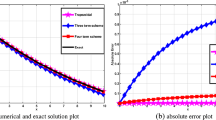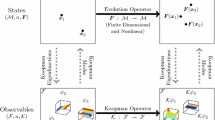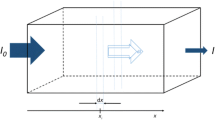Abstract
We consider stochastic differential equations (SDEs) driven by small Lévy noise with some unknown parameters and propose a new type of least-squares estimators based on discrete samples from the SDEs. To approximate the increments of a process from the SDEs, we shall use not the usual Euler method but the Adams method, that is, a well-known numerical approximation of the solution to the ordinary differential equation appearing in the limit of the SDE. We show the consistency of the proposed estimators and the asymptotic distribution in a suitable observation scheme. We also show that our estimators can be better than the usual LSE based on the Euler method in the finite sample performance.


Similar content being viewed by others
References
Applebaum, D. (2009). Lévy processes and stochastic calculus, second ed., Cambridge Studies in Advanced Mathematics, vol. 116, Cambridge University Press, Cambridge.
Butcher, J. C. (2016). Numerical methods for ordinary differential equations (3rd ed.). Chichester: John Wiley & Sons Ltd.
Davis, P. J. (1963). Interpolation and approximation. republication, with minor corrections, of the original, with a new preface and bibliography (p. 1975). New York: Dover Publications Inc.
Evans, L. C. (2010). Partial differential equations, second ed., Graduate Studies in Mathematics, vol. 19, American Mathematical Society, Providence, RI.
Genon-Catalot, V. (1990). Maximum contrast estimation for diffusion processes from discrete observations. Statistics, 21(1), 99–116.
Hairer, E. Nørsett, S. P. and Wanner, G. (1993). Solving ordinary differential equations. i. Nonstiff problems, second ed., Springer Series in Computational Mathematics, vol. 8, Springer.
Hairer, E. & Wanner, G. Solving ordinary differential equations. ii. stiff and differential-algebraic problems, second revised ed., Springer Series in Computational Mathematics, vol. 14, Springer.
Iserles, A. (2008). A first course in the numerical analysis of differential equations, 2 ed., Cambridge Texts in Applied Mathematics, Cambridge University Press.
Laredo, C. F. (1990). A sufficient condition for asymptotic sufficiency of incomplete observations of a diffusion process. The Annals of Statistics, 18(3), 1158–1171.
Long, H., Shimizu, Y., & Sun, W. (2013). Least squares estimators for discretely observed stochastic processes driven by small Lévy noises. Journal of Multivariate Analysis, 116, 422–439.
Long, H., Ma, C., & Shimizu, Y. (2017). Least squares estimators for stochastic differential equations driven by small lévy noises. Stochastic Process Application, 127(5), 1475–1495.
Mao, X. (2008). Stochastic differential equations and applications (2nd ed.). Chichester: Horwood Publishing Limited.
Ogihara, T., & Yoshida, N. (2011). Quasi-likelihood analysis for the stochastic differential equation with jumps. Statistical Inference for Stochastic Processes, 14(3), 189–229.
Shimizu, Y. (2017). Threshold estimation for stochastic processes with small noise. Scandinavian Journal of Statistics, 44(4), 951–988.
Sørensen, M., & Uchida, M. (2003). Small-diffusion asymptotics for discretely sampled stochastic differential equations. Bernoulli, 9(6), 1051–1069.
Uchida, M. (2004). Estimation for discretely observed small diffusions based on approximate martingale estimating functions. Scandinavian Journal of Statistics, 31(4), 553–566.
van der Vaart, A. W. (1998). Asymptotic statistics, Cambridge Series in Statistical and Probabilistic Mathematics (Vol. 3). Cambridge: Cambridge University Press.
Acknowledgements
This research was partially supported by JSPS KAKENHI Grant-in-Aid for Scientific Research (A) #17H01100 and JST CREST #PMJCR14D7, Japan.
Author information
Authors and Affiliations
Corresponding author
Additional information
Publisher's Note
Springer Nature remains neutral with regard to jurisdictional claims in published maps and institutional affiliations.
A Appendix
A Appendix
Lemma A.1
Let \(\ell \in {\mathbb {N}}\). Let \(\gamma _{\ell \nu }\) and \(\beta _{\ell \nu }\) be given by (1.3) and (1.4). Then
Proof
The conclusion is obtained from
for \(\ell =1,2\dots \), and
for \(\ell =0,1,\dots \). \(\square \)
Lemma A.2
Let g be a continuous function on \({\mathbb {R}}^{d}\), let \(t\mapsto y_t\) be an \({\mathbb {R}}^{d}\)-valued continuous function on [0, 1], and let \(\{f(\cdot ,\theta )\}_{\theta \in \Theta }\) be a pointwise equicontinuous family of functions from \({\mathbb {R}}^{d}\) to \({\mathbb {R}}^d\). If \(\ell /n\rightarrow 0\) as \(n\rightarrow \infty \), then

as \(n\rightarrow \infty \), uniformly in \(\theta \in \Theta \).
Proof
Since \(\{f(y_\cdot ,\theta )\}_{\theta \in \Theta }\) is uniformly equicontinuous on [0, 1], for any \(\eta >0\) there exists \(N\in {\mathbb {N}}\), such that \(\theta \in \Theta \), \(|s-t|\le 1/N\) \(\Rightarrow \) \(\left| f(y_s,\theta ) - f(y_t,\theta ) \right| < \eta \). Then, for all \(n\ge N\), \(t\in [0,1)\) and \(\theta \in \Theta \)

and we have

uniformly in \((t,\theta )\in [0,1)\times \Theta \). By the continuity of g, we obtain

as \(n\rightarrow \infty \), uniformly in \(\theta \in \Theta \). Since \(\{g\circ f(y_{\cdot },\theta )\}_{\theta \in \Theta }\) is equicontinuous at \(t=0\), for \(\ell \ge 2\)

as \(\ell /n\rightarrow 0\), uniformly in \(\theta \in \Theta \). \(\square \)
Let \((\Omega ,P,{\mathscr {F}})\) be a probability space, and let \({{\,\mathrm{Sym}\,}}_{p}({\mathbb {R}})\) denote the set of all \(p\times p\) symmetric matrix with real entries and with the Frobenius norm \(\Vert \cdot \Vert _{F}\).
Lemma A.3
Suppose that \(v_n\overset{p}{\rightarrow }v\) in \({\mathbb {R}}^p\) and \(M_n\overset{p}{\rightarrow }M\) in \({{\,\mathrm{Sym}\,}}_p({\mathbb {R}})\) as \(n\rightarrow \infty \), \(w_n\) satisfies \(v_n=M_n w_n\). If M is positive definite, \(w_n\overset{p}{\rightarrow }M^{-1}v\).
Proof
Let \(\eta \) be an arbitrary positive number less than the smallest eigenvalue of M. If \(\Vert M_n-M\Vert _{F}<\eta \), then  , where \({\mathbb {I}}_{p\times p}\) is the identity matrix of size p and
, where \({\mathbb {I}}_{p\times p}\) is the identity matrix of size p and  is the Loewner order. This implies that \(M_n\) is invetible and
is the Loewner order. This implies that \(M_n\) is invetible and

Since \((M\pm \eta {\mathbb {I}}_{p\times p})^{-1}\rightarrow M^{-1}\) in \({{\,\mathrm{Sym}\,}}_{p}({\mathbb {R}})\) as \(\eta \rightarrow 0\), there exists a positive number \(\tilde{\eta }\) depending only on M, p and \(\eta \), such that \(\Vert M_n^{-1}-M^{-1}\Vert _F<\tilde{\eta }\) and \(\tilde{\eta } \rightarrow 0\) as \(\eta \rightarrow 0\).
Set \({\mathscr {D}}_n:=\{\omega \in \Omega \, | \, M_n(\omega )~\text {is invertible}\}\). Then, if an arbitrary positive number \(\tilde{\eta }\) is sufficiently small, for some \(\eta >0\), we have
where \({\varvec{1}}_A\) is the indicator function on a set \(A\subset \Omega \). Hence, we obtain
as \(n\rightarrow \infty \). \(\square \)
Rights and permissions
About this article
Cite this article
Kobayashi, M., Shimizu, Y. Least-squares estimators based on the Adams method for stochastic differential equations with small Lévy noise. Jpn J Stat Data Sci 5, 217–240 (2022). https://doi.org/10.1007/s42081-022-00155-1
Received:
Revised:
Accepted:
Published:
Issue Date:
DOI: https://doi.org/10.1007/s42081-022-00155-1
Keywords
- SDE driven by Lévy noise
- The Adams method
- Small noise asymptotics
- Asymptotic distribution
- Discrete observations




